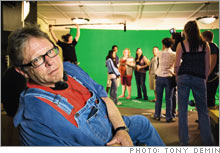A Hollywood expat trains would-be ScorsesesPowerhouse director Peter Rosten prepares high school students for film careers from an outpost in Montana.(FSB) Darby, Mont. -- When filmmaker Peter Rosten's midlife crisis hit, he didn't buy a Porsche or start dating a 25-year-old. Instead he moved to a small town in Montana and began teaching high school kids how to make movies. Rosten had worked as an independent Hollywood director and producer for 32 years. Among his credits are the films "True Believer" (starring James Woods), television series "Eddie Dodd," and the Emmy-nominated docudrama "The Greatest Story Never Told," about the contributions of African Americans during the Revolutionary War. By age 52, Rosten was tired of the grind. So he moved to the tiny town of Darby, Mont., where he had a second home. He fished, helped out on a friend's ranch, and played music. But after two years he grew restless and started mulling over his options. One night, over a beer at a local bar, he thought, "What do I do best?" The answer, of course, was making movies, TV shows, and commercials. "And that was it," he says. He decided to teach filmmaking in Montana's public schools, where a lack of state funding had severely cut back arts programs. "The kids didn't have meaningful, relevant opportunities in the arts, especially the media arts," says Rosten. "I thought I could teach something like that." Never mind that he lacked a teaching credential or any classroom experience. Decades in Hollywood had made Rosten a master pitchman. So that's what he did with his program, Media Arts in the Public Schools, or MAPS for short (mediarts.org). Over the course of three months he persuaded Corvallis Public Schools superintendent Daniel Sybrant to give the program a try. "Peter sold us on it," says Sybrant. "It's a testament to his drive and his vision of how he wanted to give back." Over the course of a semester, MAPS students write, produce, and direct a 30-minute film. The program has become so popular that Rosten began requiring an audition for admission. About 50 percent of MAPS funding comes from work the students do for real clients, who pay a fee "in the high five figures," according to Rosten. Last year the class at Corvallis produced two public-service announcements about drunk driving for a county DUI task force, and in January it launched a public-service campaign, "Hungry for Knowledge, Go to College," for the Montana Student Assistance Foundation. "I learned how to edit film, but I also became a better person," says MAPS graduate Luke McLean, 19. "I learned how to organize myself, establish a budget, and work with a team." |
Sponsors
|

